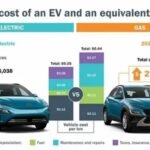Do Electric Cars Last Longer Than Gas Cars? Find Out Here

Do Electric Cars Last Longer Than Gas Cars? As you consider purchasing an electric vehicle (EV) or sticking with a gas car, understanding the lifespan of each type of vehicle is crucial.

The lifespan of electric cars compared to gas cars is a topic of increasing interest due to the growing popularity of EVs. You might be wondering how long each type of vehicle lasts and what factors contribute to their longevity.
In this section, we’ll introduce the main topic of discussion: comparing the lifespan of electric cars and gas cars. We’ll explore the general expectations and key differences between these two types of vehicles.
Key Takeaways
- Understanding the average lifespan of electric and gas cars.
- Factors that affect the longevity of electric and gas vehicles.
- Comparison of maintenance costs between electric and gas cars.
- Impact of battery durability on electric car lifespan.
- Environmental factors influencing the lifespan of both types of vehicles.
Do Electric Cars Last Longer Than Gas Cars?

As you weigh the pros and cons of electric vehicles versus gas cars, their lifespan is a crucial aspect. The longevity of a vehicle is determined by various factors, including its design, maintenance, and usage.
Average Lifespan Expectations
Research indicates that electric vehicles generally have a longer lifespan due to fewer moving parts and less wear on the vehicle. On average, electric cars are expected to last around 15 to 20 years, with some lasting even longer. In contrast, gas cars typically have a lifespan of around 10 to 15 years, depending on the make and model.
Key Components and Their Durability
The durability of key components plays a significant role in determining the overall lifespan of a vehicle. For electric vehicles, the battery is a critical component.
Battery Longevity in EVs
Most electric vehicle manufacturers guarantee their batteries for 8 to 10 years, with some providing warranties for up to 12 years. The battery’s longevity is influenced by factors such as charging habits, driving conditions, and overall maintenance.
Engine Durability in Gas Vehicles
Gas vehicles, on the other hand, have more complex engines that can be prone to wear and tear over time. Regular maintenance is essential to extend the lifespan of a gas vehicle’s engine.
Real-World Owner Experiences
Many electric vehicle owners report high satisfaction with their vehicles’ performance and durability. In fact, a study found that electric vehicle owners tend to keep their vehicles for longer periods than gas car owners. This could be due to the lower operating costs and reduced maintenance requirements associated with electric vehicles.
Benefits of Electric Car Longevity include lower maintenance costs, reduced environmental impact, and improved performance over time. As the demand for electric vehicles continues to grow, understanding their longevity compared to gas cars becomes increasingly important.
Factors Affecting Vehicle Longevity
The lifespan of your car is determined by a variety of factors, including maintenance, environmental conditions, and driving habits. Understanding these elements can help you maximize the longevity of your vehicle, whether it’s an electric car or a gas car.
Maintenance Requirements Comparison
One of the significant advantages of electric vehicles (EVs) is their lower maintenance requirements compared to gas cars. EVs have fewer moving parts and do not require oil changes, which can lead to reduced maintenance costs over time. For instance, electric cars do not have components like oil filters, fuel filters, or spark plugs that need regular replacement in gas cars.
- Less wear and tear on brakes due to regenerative braking
- No oil changes required, reducing maintenance costs
- Fewer moving parts, resulting in less mechanical failure
According to a study, the average maintenance cost for EVs is about 30% less than for gas-powered vehicles over their lifespan. This is a significant factor when comparing gas car lifespan with electric cars.
Environmental Impact on Lifespan
Environmental factors, such as extreme temperatures, can significantly impact the lifespan of both electric and gas vehicles. However, EVs are often better insulated, which can reduce the strain on their batteries. For example, in very cold climates, gas cars may experience a decrease in fuel efficiency, while EVs may see a reduction in their battery range.

Driving Habits and Their Effects
Your driving habits play a crucial role in determining the lifespan of your vehicle. Aggressive driving, such as rapid acceleration and hard braking, can reduce the life of both EVs and gas cars. EVs, in particular, can experience battery degradation if subjected to extreme driving conditions regularly.
“Driving habits can significantly affect the longevity of your vehicle. Smooth acceleration and braking can help extend the life of your car’s components.”
Economic Considerations Over Time
Economic considerations, including fuel costs and potential savings, can influence the overall cost of ownership and perceived longevity of your vehicle. EVs generally offer savings on fuel costs, as electricity is typically cheaper than gasoline. Additionally, EVs may qualify for various incentives, such as tax credits, further enhancing their economic appeal.
When evaluating the sustainability of electric vehicles, it’s essential to consider not just their environmental impact but also their economic benefits over time.
Conclusion
When comparing electric cars and gas cars, it’s clear that both have their strengths and weaknesses regarding longevity. Electric vehicles offer several advantages, including lower maintenance needs and potentially longer lifespans, making them a reliable choice over time.
The actual lifespan of your vehicle depends on various factors, including how you drive and maintain it. Understanding the differences in electric car reliability over time and gas car vs electric car longevity will help you make an informed decision when choosing your next vehicle.
As the automotive industry continues to evolve, being aware of the respective longevities of electric and gas cars will ensure you’re prepared for the long-term ownership experience. Whether you opt for an EV or a gas car, you can make a more informed decision by considering these factors.
FAQ
Do electric cars last longer than gas cars?
Generally, electric vehicles have a longer lifespan due to fewer moving parts and less wear on the vehicle. Most manufacturers guarantee their batteries for 8 to 10 years.
What are the key factors that affect the longevity of electric and gas cars?
Maintenance requirements, environmental impact, driving habits, and economic considerations all play a role in determining the lifespan of your vehicle.
How do maintenance requirements compare between electric and gas cars?
Electric vehicles typically require less maintenance due to fewer moving parts and no oil changes required, saving you time and money.
Can driving habits impact the lifespan of my electric or gas car?
Yes, aggressive driving can potentially reduce the life of both electric and gas cars, so driving smoothly can help extend the lifespan of your vehicle.
Are electric vehicles more reliable over time compared to gas cars?
Many electric vehicle owners report high satisfaction with their vehicles’ performance and durability, suggesting that electric vehicles can be reliable over time.
How does the environmental impact affect the lifespan of electric and gas cars?
Extreme temperatures can impact both types of vehicles, but electric vehicles are often better insulated, reducing the strain on their batteries.
What are the economic considerations when comparing electric and gas cars?
Fuel costs and potential savings can influence the overall cost of ownership and perceived longevity of your vehicle, with electric vehicles often offering lower operating costs.
Can I expect my electric car to last as long as a gas car?
While individual results may vary, electric vehicles generally have a longer lifespan due to their simpler design and fewer moving parts.
How do battery longevity and engine durability compare between electric and gas cars?
Electric vehicle batteries are designed to last, with most manufacturers providing lengthy guarantees, while gas vehicle engines can be more prone to wear and tear over time.
























































































































































































































































































































